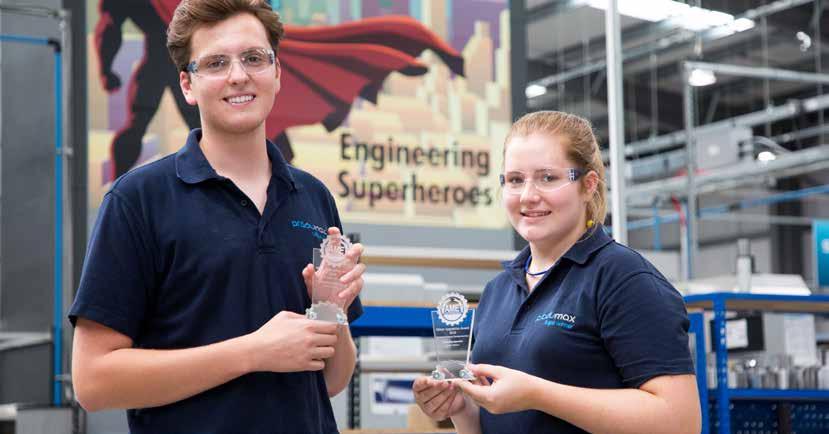
7 minute read
CHANGING HOW WE TALK – AND THINK –ABOUT MANUFACTURING
The ability to make things is the bedrock of strong economies and societies. However, in the UK manufacturing is too often seen as “something we don’t really do much of anymore” or “a problem to be fixed”.
Do these misperceptions matter? Yes, because if we are not able to explain the true importance of manufacturing, it will drift down policy-makers’ agendas, it will fail to attract the most skilled people and we won’t get the balanced and robust economy and communities that we all want.
Advertisement
It’s time for a change in how we talk about manufacturing – and that means we must change how we think about it as well.
In the UK we are rightly proud of our central role in the First Industrial Revolution, the influence of which we feel even today. Manufacturing still plays a major role in our economy. It provides over 2.5 million jobs, almost half of our exports and around two-thirds of all UK R&D business expenditure. We are a top 10 global manufacturing nation.
But manufacturing is often discussed simply in terms of its share of GDP – which is about 10% – and how it is declining in relation to other parts of our economy. This substantially misses manufacturing’s real contribution to our lives. As a result, the role of manufacturing is often undervalued by those with power and influence, who sit outside the world of those who make and ship things.
The COVID-19 pandemic briefly shone a light on the extraordinary, yet often hidden, role that manufacturing plays in our society. While amazing tales of heroic efforts to assemble ventilators and produce vaccines were rightly highly newsworthy, they risk being quickly forgotten as we move to the next economic and social crisis. Does this matter? Yes, because a poor understanding of manufacturing’s real importance could weaken the case for the support and investment it needs to flourish. This presents a major risk to the future prosperity of the UK.
But there is a way we can ensure this doesn’t happen.
What’s the (new) story?
In 2019 a report published by the University of Cambridge offered a new perspective on the importance of manufacturing. The report showed that the contribution of manufacturing was much more significant to the UK economy than conventional and simplistic measurements such as GDP seem to show. Why? Because the economic value of manufactured goods increasingly depends on activities – such as R&D, design and testing services – that are often categorised as belonging to other sectors of the economy.
Not only are we measuring it incorrectly, manufacturing is also changing. Digital technologies, new production processes, complex business models that combine products and services, supply chains in a constant state of flux, are combining to transform the manufacturing world. In addition to changes in how we make and distribute things, the way we develop new products is also evolving – from the use of machine learning to capture a deeper understanding of future user needs, to 3D printing enabling the rapid trialling of new concepts. And the role of customers throughout the whole process is transforming. All of this means that our definitions of industrial systems – and the language we use to talk about manufacturing – need an upgrade.
This new story needs to convey a simple and clear message: that manufacturing is a key part of the solution to many of the biggest issues we are facing. It is a message that those who don’t work in manufacturing must be able to readily engage with – and share. Why? Because we need those outside the world of manufacturing to become evangelists for manufacturing.
A new narrative
With this better understanding of what manufacturing is and how it is changing, we can now frame the new story of manufacturing. Manufacturing is a vital part of the way to deliver the high-level goals we all want: an economy that is less damaging to the planet but which still gives us the quality of life we want; more capable of responding to shocks and change; and better able to provide fulfilling and rewarding opportunities for all.
For many years since the Industrial Revolution, the environmental impact of making things was widely ignored. Manufacturing is now often perceived as being a “bad thing” that intrinsically pollutes. Yet manufacturing addresses a fundamental set of human needs: people need things – clothing, shelter, food, medicines, and so much more –and these things must be made and transported to where they are needed.
What is required – and is happening – is to find ways to reduce the environmental impact of how we make and ship things. Huge strides have been made in incrementally reducing the harmful impact of production and transportation. We also see radical rethinking, such as the use of 3D printing to compress the distances that components and finished products are shipped by producing them close to – or even at – the point of need. Huge efforts are going into the designing, making and scaling-up of products that, by their very nature, reduce environmental impact – from zeroemission vehicles to renewable energy systems.
Pandemics, natural disasters, wars, even a single error on one ship navigating the Suez Canal, have shown how easily disrupted our industrial systems are. Our current approaches are just too fragile. There are also longer-term, “slow-burn” changes that we need to respond to – think of the impact of automation and digitalisation on everything, and the shift to lowemission technologies for all land, air and sea transport.
A look at other nations reveals that those with strong, export-led manufacturing sectors and supportive industrial strategies seem better able to prepare for and rebound from such storms. Those nations also seem better prepared to capture the opportunities from longer-term changes, such as the now rapid shift to electric vehicles and widespread availability of digital technologies, with the potential to benefit manufacturing firms of all sizes.
People are – and must remain – at the heart of manufacturing. Manufacturing needs highly skilled people to deal with the issues described above Manufacturing offers well-paid, highskilled jobs and must draw upon the widest pool of talent possible. Despite increased levels of automation, these basic facts won’t change. Manufacturing also creates strong communities: manufacturers require good suppliers, they are customers for business support services, and they offer returns for longterm investment built on the application of new skills and capabilities.
These three things – sustainability, resilience, community – sit at the heart of our new manufacturing story.
Think differently
However, it’s not just how we talk about manufacturing that needs to change. We need to think differently about it, too.
First, we need to move from the view of “the manufacturing sector” as something that stands separate from our daily lives. It might just be me, but I sometimes feel there is a weird perceived disconnect between the world of making and distributing things, and the world of consumption.
Working in manufacturing for 20 years, I have become dangerously blinkered to this. I am too often taken aback by comments from smart people who are themselves surprised to learn that manufacturing is still thriving in the UK – and its critical role in all our lives. A key part of the message we need to spread is: manufacturing affects every aspect of our lives. We make choices about what we choose to buy (or not buy). We make choices about how we buy. And all of this directly impacts the decisions made by manufacturing firms and their investors. What’s more, our role as consumers within the manufacturing world has been amplified in recent years by digitalisation enabling the seamless flow of data through the design, production and use of so many products that we use every day.
This leads to a second key point: the need to be much better at “joining up the dots”.
There are many examples of outstanding people and programmes that support manufacturing in the UK. But one thing that gets reported to me by colleagues in industry is the lack of connections between all the initiatives aimed at the long-term development of our national manufacturing capabilities. And at the heart of this is the need to have connections between those who invest in technologies, those who help develop skills, and those who support the transformation of supply chains.
In terms of technologies, we must do two things. First, we must accelerate the adoption of existing technologies by those who most need them. A great example of this is helping smaller manufacturers adopt appropriate digitalisation technologies to improve their productivity. In parallel, we must develop and follow roadmaps to develop and capture value from emerging technologies over the coming decades – long beyond the typical political cycles. But technologies –whether existing or emerging – are of zero value if we do not have people with the right skills in the right place at the right time Picking up the example above, small manufacturing firms require access to the skills needed to adopt appropriate technologies to improve their competitiveness. But we also need to ensure that universities and colleges have the people – spanning the scientific and the technical – needed to generate and scale up new concepts. This will only work if we take an integrated view of skills development combining the academic with the vocational, spanning full-time education and through-life learning.
Yet technologies and people alone do not create value. They need to be combined in an appropriate organisational form structured around the right business model. We are seeing huge transformations in both aspects across many sectors, such as the complex supply chains for internal combustion engines shifting to electric propulsion systems, or the bulk production of pharmaceuticals shifting to the delivering of personalised medicines.
Our thinking about and support for manufacturing must treat these three parts – technologies, skills, supply chains – as one integrated system. Saying that is easy: doing it will be much harder.

But it is possible, and we can see others who are already doing it. The Biden administration has just published a new US national strategy for manufacturing It is one that is based on a vision to “grow the economy, create quality jobs, enhance environmental sustainability, address climate change, strengthen supply chains, ensure national security, and improve healthcare”. How do they plan to achieve this impressive vision? By connecting the activities around developing technologies, having an appropriate workforce both for now and in the future, and developing resilient supply chains. Sound familiar?
Manufacturing is not optional
My aim here has not been to hark back to the glory days (and they certainly weren’t all glorious) of the UK-led First Industrial Revolution. Nor is this a plea to fetishise manufacturing as something that requires special status. This is about the role that manufacturing can play in helping the UK – in its evolving position in the world – to become a more sustainable, resilient and equitable nation. To achieve that, we must be better at communicating the role of manufacturing in all aspects of our lives, now and in the future. Critically, we also need to amplify awareness that we all, as consumers, play a key part in this.
We need to spread the word that we are #allinmanufacturingnow.
Tim Minshall, Dr John C Taylor Professor of Innovation and Head of the Institute for Manufacturing thwm100@cam.ac.uk









